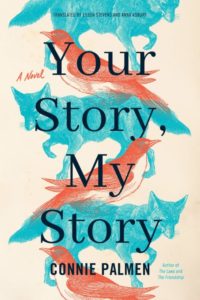Dutch author Connie Palmen has told an unexpected story.
I’ve read some of the poetry written by English poet Ted Hughes (1930-1998) and American poet Sylvia Plath (1932-1963). I had not read any biographies of either poet. I know the basic facts of their lives—their marriage in 1956, Plath’s death by suicide in 1963—but my knowledge was woefully incomplete. I knew that Hughes had been the British Poet Laureate for a time, and I had seen his memorial stone in the Poet’s Corner of Westminster Abbey.
At some point over the years, I understood that Plath had become something of a feminist icon. Related to this, Hughes was seen as something of a villain regarding his marriage to Plath and often blamed for her suicide. Her death would dog him for 35 years, until his own death. And suicide became a tragic theme in Hughes’ life; the woman he left Plath for committed suicide as well, and his and Plath’s son Nicholas committed suicide.

Palmen fictionalizes the story of Plath and Hughes in Your Story, My Story, translated from the Dutch by Eileen Stevens and Anna Asbury. It’s told largely from the perspective of Hughes, and it’s clear that the author used Birthday Letters as a primary research source. She’s written the story as a series of short, chronological observations, almost like entries in a journal. The book contains no chapter divisions; the only breaks are the spaces between entries.
I found myself interested, then intrigued and finally captivated. It was this passage, very early in the book, that hooked me.
“I loved her—I’ve loved her ever since. If her suicide was the trap she used to catch me, to swallow me, to absorb me, to become one body, she succeeded. A bridegroom taken hostage by death, linked eternally in a posthumous marriage, as inseparable as she wanted me to be from her.
“Her name is my name.
“Her death is my death.”
And thus the title, Your Story, My Story. Plath’s story became Hughes’ story, his story became her story, and the two are linked and paired forever.
It’s a story of passion and fire. From the time they met in 1956, their attraction to each other was intense, almost violently so. That intensity remains a theme, perhaps the theme, of the next seven years. It’s not a relationship marked by nuance and subtlety. Palmen describes a married couple whose lives, and life, are written in large letters and multi-colored pictures. It’s a relationship marked by high drama and extreme feelings, physical, emotional, and spiritual.

Connie Palmen
It’s a story of two people almost addicted to each other, always running the danger of an overdose. And then it’s no longer a danger but a reality.
Palmen is the author of The Laws, The Friendship, The Heritage, I.M., All Yours, Lucifer, and Journal of a Merciless Year. Her later novels explore the effect of gossip and biographical storytelling on the lives of people. Your Story, My Story was originally published in the Netherlands in 2015 and was recently translated into English.
Given how the stories of both Plath and Hughes have been used to advance political narratives, it might take a novel to get closer to what the truth about these two remarkable poets really is. Your Story, My Story may well be that novel.
Photo by Nenad Stojkovic, Creative Commons, via Flickr. Post by Glynn Young.
__________________________

“I require all our incoming poetry students—in the MFA I direct—to buy and read this book.”
—Jeanetta Calhoun Mish
- Poets and Poems: Mary Brown and “Call It Mist” - September 18, 2025
- “Horace: Poet on a Volcano” by Peter Stothard - September 16, 2025
- Poets and Poems: The Three Collections of Pasquale Trozzolo - September 11, 2025

Leave a Reply